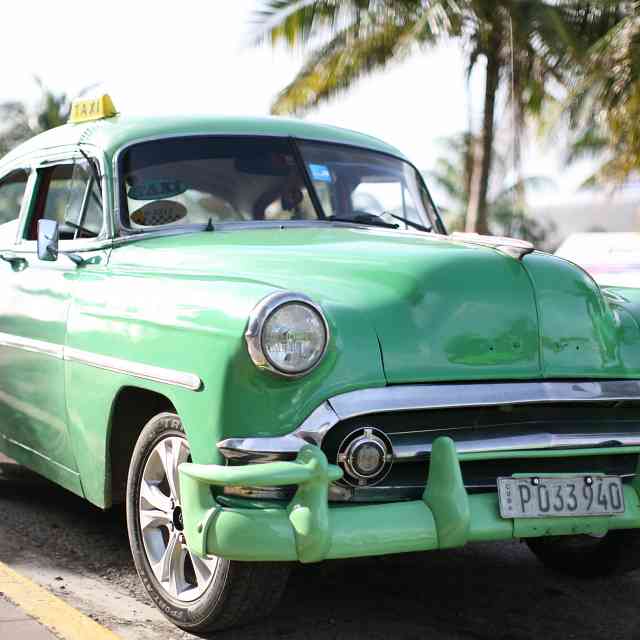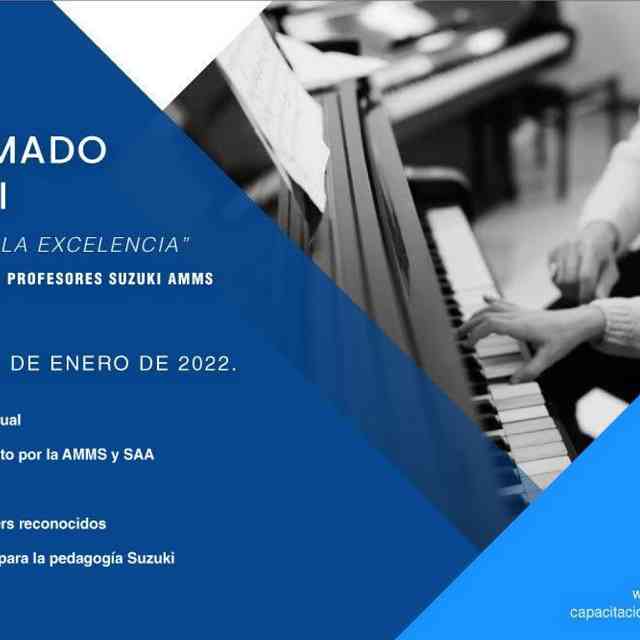Santiago de Cuba is a city known for its rich history and its distinctive cultural influence. Located in southeast Cuba, with more than five centuries since its founding, this eclectic city is known as the “capital of the Caribbean.”
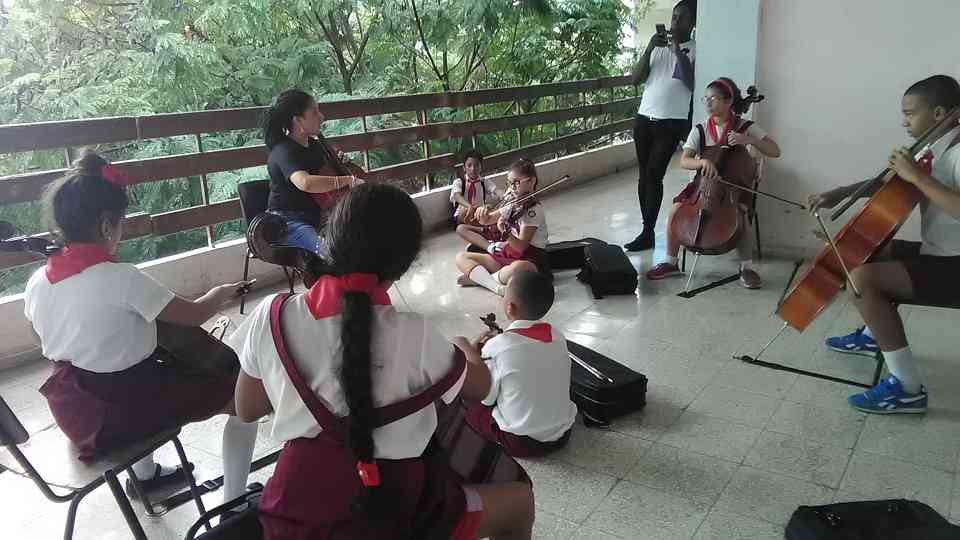
Jacqueline Jardines teaches ensemble class
A musical city par excellence, one may breathe music in its streets. A variety of musical genres have been born in this region and it has been the birthplace of many musicians renowned worldwide. Many of these received their musical training from institutions of artistic teaching which provided important links within the Cuban educational system after 1959.
Long before 1959, the city already treasured an admirable history of notable persons in the field of musical pedagogy. From the master of the Presbytery Chapel, Esteban Salas y Castro, who in the 18th century introduced the performance of several musical instruments to the musical chapel of the cathedral, converting it into a school; to Dulce Maria Serret, pianist who established herself in Santiago after completing her studies in Spain and then co-founded the Provincial Conservatory of the West, these are a few examples of the many persons who enriched the legacy of Cuban musical pedagogy while uplifting our national identity.
Musical learning currently takes place in specialized institutions where courses are offered at the elementary, intermediate, and superior levels. Longer courses of study (violin, piano, and cello) start at the age of seven or eight and continue for eleven years. Shorter courses (woodwind instruments, brass, bass, guitar, percussion, and vocal studies) start at the age of nine or ten and last nine years. Continuing studies at the superior level are, depending on the specialization, four or five more years.
Being a professor of music is an exciting passion that keeps the teacher in a constant state of study and preparation. After many years of working in musical pedagogy, teachers discover new tools, repertoire, and methods. There is, then, an eager search for up-to-date information and to always be continually learning.
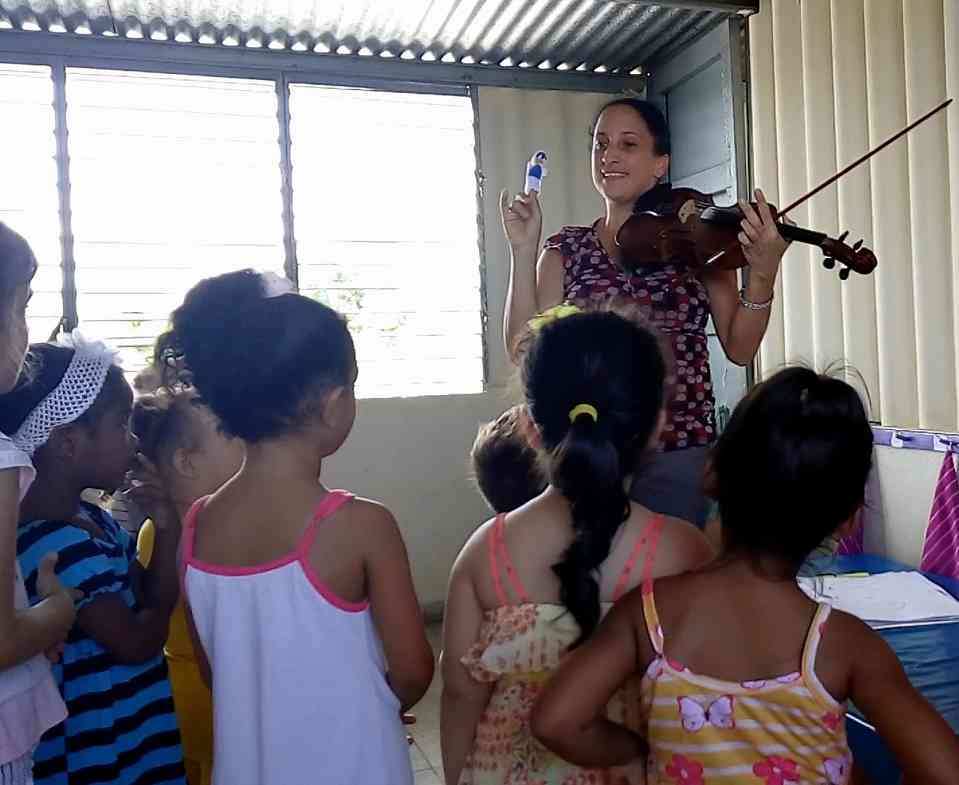
Teacher Jana in Deucureaux
It was this incessant search for knowledge that led a group of teachers to discover the work of Shinichi Suzuki. We became his followers and admirers. Even without really knowing what it was all about, we were inspired by the videos of very young children, which at first glance we called “genius children,” performing different instruments. We asked ourselves, “In what way could one educate talent in a child?”
The introduction of the Suzuki Method in Santiago de Cuba dates back to the year 2009. The emissary was Jacquiline Jardines Lopez, Santiaguera colleague, with registered Suzuki Cello School training through Book Six. Jardines Lopez worked at the Suzuki Institute of Lyon and also as the director of The A String, Suzuki School of Cello and Strings on the Antillean island of Guadalupe. She started a full-scale undertaking with the students and faculty of the String Department for the Vocational School of the Arts Jose Maria Heredia in Santiago (hereafter referred to as EVA), using the Suzuki repertoire in versions for ensembles with the school orchestra, and organizing events that created opportunities for performance and for cultural exchange between the students of both schools. This same teacher founded the String Orchestra Harold Gramatges in 2009 and would later go on to combine the programs of the School of Fine Arts Santiago de Cuba Diente de Leche and the Suzuki Project The A String, and in that way founded the first Suzuki Project of Santiago de Cuba in 2017.****
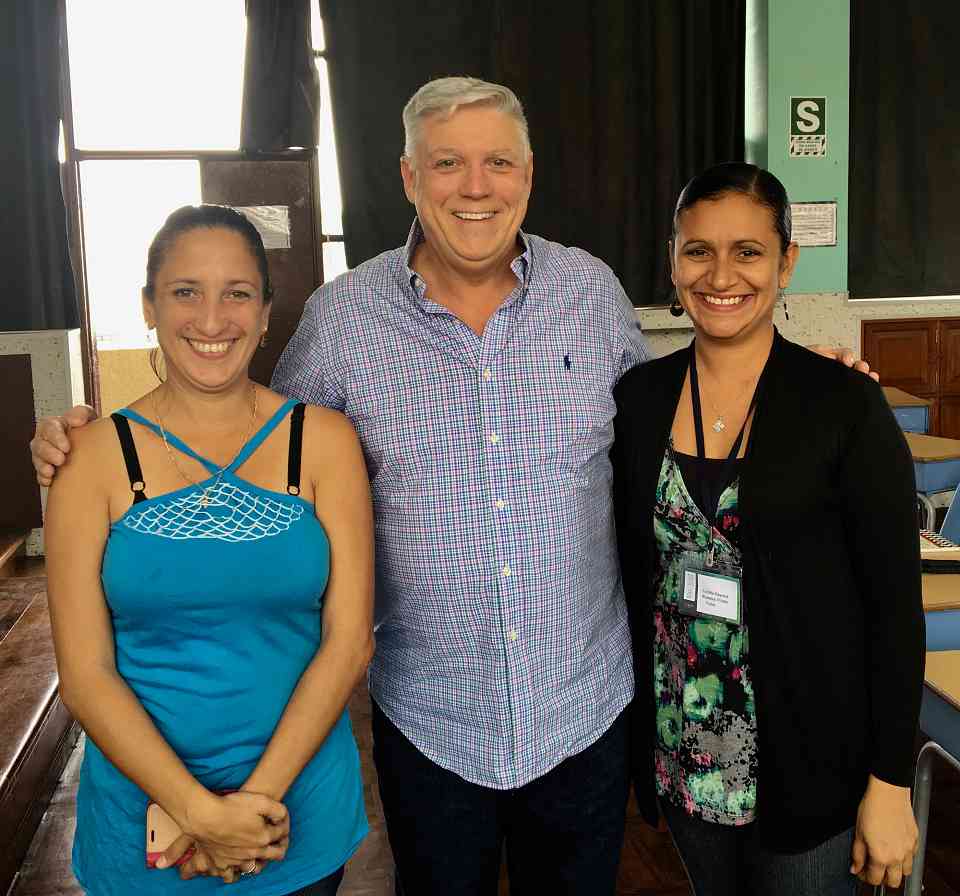
Cuban Teachers in Lima
In 2012 there was a working knowledge of the Suzuki repertoire in Cuba, but no familiarity with the pedagogical philosophy behind it. Violin professor Cecilia Dayana Rosales Prieto then discovered the website for the International Suzuki Festival in Lima, Perú. She immediately sent an email to teacher trainer Caroline Fraser expressing her interest in knowing more about the method and exploring the possibility of her and other teachers enrolling in Suzuki teacher training. She did not have to wait long for a response from Fraser or the Festival. Rosales Prieto, together with two other teachers, were invited to attend the Perú Festival in 2013. Due to a variety of bureaucratic reasons, however, they were not able to attend.
But the interest was still there. In February 2017, a great friend of and enthusiastic collaborator with the musicians of Cuba, the Swiss bassist Egmont Rath, organized the First Workshop of the Suzuki Method for Teaching the Violin led by European Suzuki Association (ESA) Teacher Trainer Agathe Jerie from Switzerland. Intermediate students from the Conservatory Esteban Salas and elementary students from the EVA, together with the faculty from the string departments of both schools, participated in this event and were able to experience the true spirit of the Suzuki method.
This event was most significant in that it linked the Suzuki philosophy with teaching Violin Book One. It was the first time the philosophy was discussed in Cuba, and since then a passion for the method has gripped a handful of Cuban teachers. These teachers are happily impressed with the vision of what is possible for young children through the method and with how the philosophy can contribute to the teaching of music in Cuba. The first marvelous experiences of teaching while practicing the philosophy have created a spark that has caught fire in Santiaguero musical hearts. We are eternally grateful to Egmont and Professor Agathe for all they taught us in the first Suzuki workshop.
Two workshop participants, Rosales Prieto and her colleague Jana Marieta Perdigón, found in the Suzuki method their true pedagogical calling. These enthusiastic and enterprising women approached their Teacher Trainer at the conclusion of the class and asked how they could become Suzuki teachers. From that moment on, thanks to this small but important step, they have received extraordinary support and collaboration from friends around the world.
During 2018 much has been accomplished toward the progress of the method in our province. In January Rosales Prieto and Marieta Perdigón attended the 33rd International Festival in Perú. They had been invited, once again, to attend by the organizing committee and were granted scholarships from the Suzuki Association of the Americas (SAA). They also received additional support from the Suzuki teachers of Holy Names University in California, Donut Studio in Taiwan, and the Asociación Suzuki del Perú. At the Perú Festival, they received training in Filosofia and music reading with Caroline Fraser and completed the Suzuki Violin Book One course with Edward Kreitman.
In February, Agathe Jerie taught our friend, Egmont Rath, how to make a cardboard violin in advance of his trip to Cuba. He, in turn, taught teachers cardboard violin making in a Pre-Twinkle course he offered in Santiago de Cuba.
In April, Marieta Perdigón and Pastor Julio Cesar Machado of the Baptist Church of Deucureaux created the Kindergarten Suzuki Project of Deucureaux. The original group of students was made up of ten children ages three to seven. This lovely work has quickly grown and now depends on the collaboration of five violin teachers (Cecilia Rosales, Mayra Quintana, Claudia Pantoja, Claudia Rodríguez y Jana) who dream of expanding the project to more locations in Santiago and throughout Cuba.
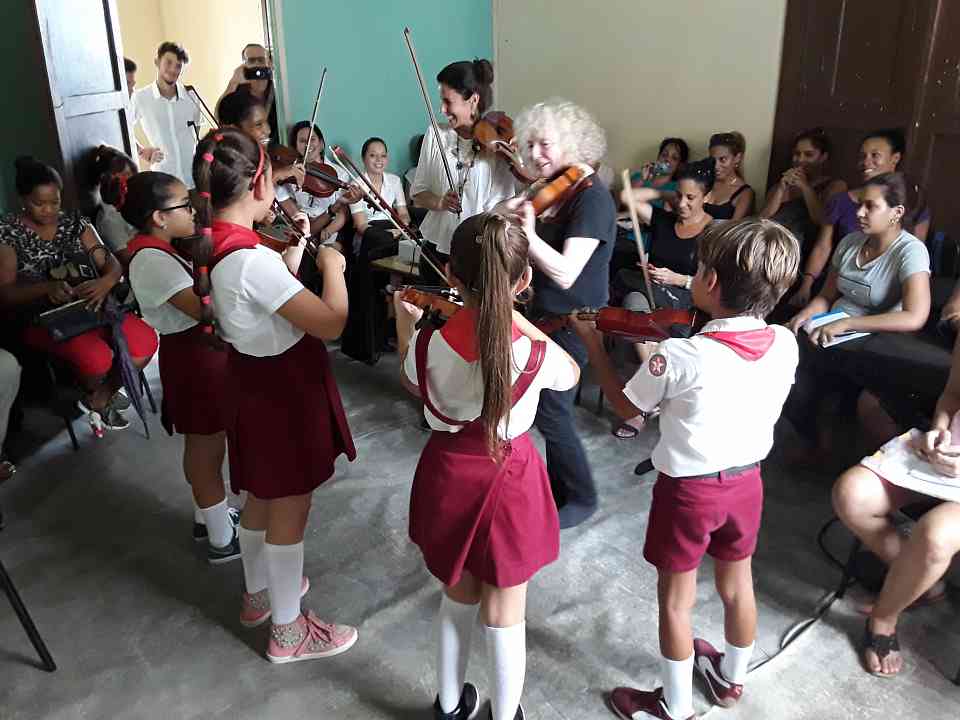
Group class with Caroline Fraser and Renata Jordao
In September, in response to the invitation extended during the 33rd Perú Festival, Caroline Fraser came to Cuba to offer a course in Suzuki Philosophy, along with the Brazilian violin teacher Renata Jordao, who taught the Suzuki Book One and Pre-Twinkle course. Students, parents, and teachers from various schools in the city participated.
Continuing the journey started by Agathe, this first course of Suzuki Philosophy with Fraser was accredited by the SAA. Twenty-two participants, including violinists, cellists, bassists and theory teachers, received their certificates at the conclusion of the course.
All of us dream of being able to continue improving and learning more about the method. To transform these dreams into reality, four violin teachers have been invited to continue their teacher training courses at the 34th Perú Festival in January 2019. These four are receiving generous sponsorship from the international Suzuki community, teachers and families from Europe, as well as scholarships from the SAA.
For those of us who have participated in the events that have advanced the knowledge and practice of the Suzuki Method in Cuba, it has been a lovely experience that has changed our lives. Learning and understanding the philosophy has revolutionized our thoughts and our educational endeavors as teachers and parents. Assuming that “every child can learn” and that talent is not inborn has overturned our conceptions and led to a new way of teaching. Dreams come true each day as we learn a bit more of the philosophy and connect new children, parents and teachers to this revolutionary way of learning music—always keeping in mind Shinichi Suzuki’s maxim that what is important is not the creation of musicians, but to change the world through music.
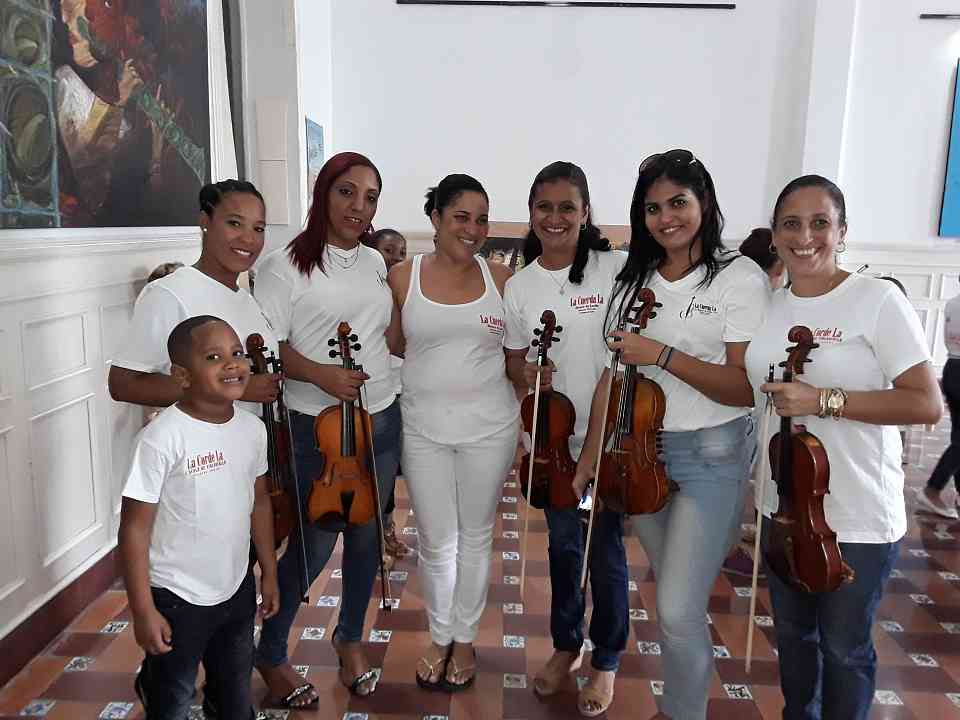
Jacqueline Jardines with Suzuki Teachers
The budding Suzuki Group of Santiago de Cuba wishes to especially thank all those that have made it possible for the method to be made known in Cuba, and who have actively collaborated for the advancement of Suzuki in Latin America and around the world. To Jacqueline Jardines, Egmont Rath, Agathe Jerie; to Caroline Fraser along with Asociación Suzuki del Perú; to Pam Brasch of the SAA; to Pastor Julio Cesar Machado of the Baptist Church of Deucureaux and his family for being the first to offer a space for pre-school Suzuki teaching in Cuba; to our dear friend Professor Renata Jordao; to the Pré Kong family from Peru; to Professor Tammy Lin; to Alejandro Soldado from Spain who writes about Suzuki in Cuba; and so many others who have labored tirelessly with us.
For all these we express our infinite gratitude and our promise to continue working for the development of this beautiful project.
Thank you.
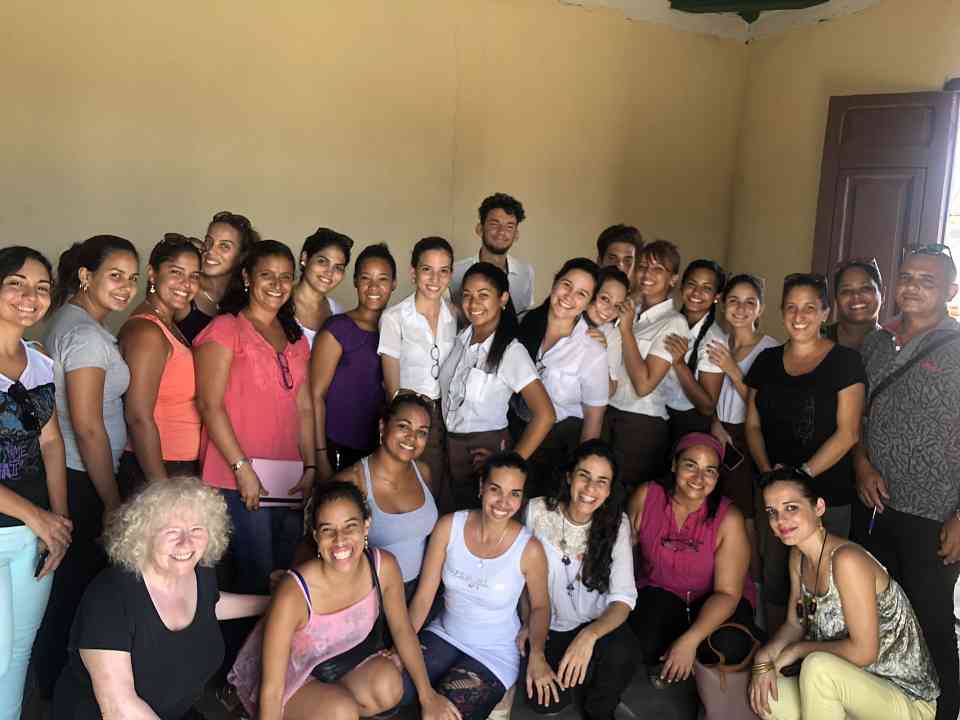
September 2018 Filosofia Course with Caroline Fraser
Acknowledgments
-
I am grateful to Dr. Maria Zielina, Professor Emeritus at California State University Monterey Bay, California, US, who recognized the role that Suzuki’s teaching has played in my life, and gave me advice and comments about my article.
-
Alejandro Soldado, friend of Cuban teacher who published some articles about Suzuki in Cuba on the Internet.
-
Maritza Puig, musicologist from Santiago de Cuba.
-
Jorge Rosales, my father, who suggested corrections for this article.
-
The father of the Deucureaux children and their teachers for the pictures.
Notes
Aysmara Borlot-Faure, “Algunas consideraciones sobre la Educación Musical en Santiago de Cuba,” revista electrónica Maestro y Sociedad (2016).
“The impact of the inauguration of the Method Suzuki in Santiago de Cuba,” in the newspaper Santiago 24 Horas (January 12, 2018).
Caroline Fraser and Renata Jordao, “XXXIII International Suzuki Festival – Lima, Perú,” in American Suzuki Journal 46, no. 3 (2018).

